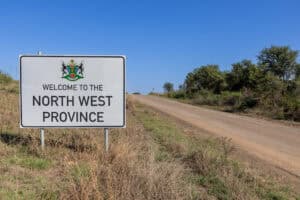Despite the signing of the agreement, Musina residents remain skeptical about the outcome of the treaty.

As South Africa continues to grapple with a severe water shortage, the country has turned to neighboring nations to meet its water supply demands.
On Thursday, Zimbabwe and South Africa signed a treaty to address the water scarcity issue in Musina, a town located in the Limpopo province. However, skepticism among Musina residents regarding the effectiveness of the treaty has cast doubts on the future of this water supply solution.
The treaty was signed in Harare, Zimbabwe, by Zimbabwean Lands, Agriculture, Fisheries and Rural Development Minister Anxious Masuka and South Africa’s Water and Sanitation minister Senzo Mchunu.
The Memorandum of Understanding (MoU) outlines the arrangement for Beitbridge, a border town in Zimbabwe, to supply treated water to Musina.
ALSO READ: ‘We should be investing R3 billion annually’: City of Joburg speaks on water crisis
Lack of trust in mayor
Musina, a dry border town in South Africa, has been grappling with limited water sources and relies heavily on borehole water.
The agreement aims to address the water scarcity plaguing the town, which is home to approximately 132 000 people residing across 192 villages. The deal will allow for the supply of around 15 million cubic meters of treated water per day from Beitbridge to Musina through a 20km pipeline.
Speaking to Newzroom Afrika one of the residents, Geraldine Noshi, voiced her discontent, expressing a lack of trust in the promises made by the authorities.
READ MORE: Joburg residents fear tanker water is ‘dirty’, making people sick
“No I am not satisfied because I don’t believe them because it has been a long time that they’ve been making promises and lies,” she said.
Noshi further highlighted the absence of tangible proof, such as a Memorandum of Understanding, as a reason for their skepticism.
“They were supposed to show us proof saying that ‘here is the temporary license signed between SA and Zimbabwe for the supply of treated water.”
Furthermore, concerns about the quality of water supplied from Zimbabwe due to the ongoing cholera outbreak in the country have added to their apprehension.
Residents also expressed their lack of trust in the mayor, citing unfulfilled promises and a history of dishonesty.
“We are tired of his lies, there’s no more trust. This is why we had poster boxes to show the minister as we knew we would not be given a chance to talk to the minister… I could see that the mayor was not happy when the minister requested to see the posters,” she concluded.
Water supply services
The water supply treaty between the countries builds upon the 2015 bilateral cooperation agreement on water resources management and the establishment of a joint water commission.
Zimbabwe, Botswana, Mozambique, and South Africa are members of the Limpopo Watercourse Commission (LIMCOM), an organisation established to manage shared water resources among the four countries.
Speaking on KayaFM Director General of Water and Sanitation, Dr Shaun Phillips, explained that acquiring water from Zimbabwe was a cost-effective alternative for the country.
He said by using Zimbabwe’s existing water treatment facilities and underutilised dams, South Africa can save on the expenses associated with constructing new dams.
NOW READ: Water outage: It’s no fun to be left high and dry
“The best decision for the medium term for Musina is for us to buy treated water from the Beitbridge water treatment works and then build a pipeline from there to Musina with a couple of pump stations,” said Phillips.
Phillips further clarified that the temporary agreement signed will last for approximately two years. During this period, a long-term water supply solution for Musina will be explored and approved.
Furthermore, the department director general explained the financial arrangements of the treaty.
“The Vhembe District municipality, the water services authority, sells water to its customers which includes the residents and businesses in Musina.
“It uses that revenue to do maintenance but also a portion of that revenue will be used to pay off parts of the finances that will be raised to fund the project and also to pay the Zimbabwe authorities for the water.”






